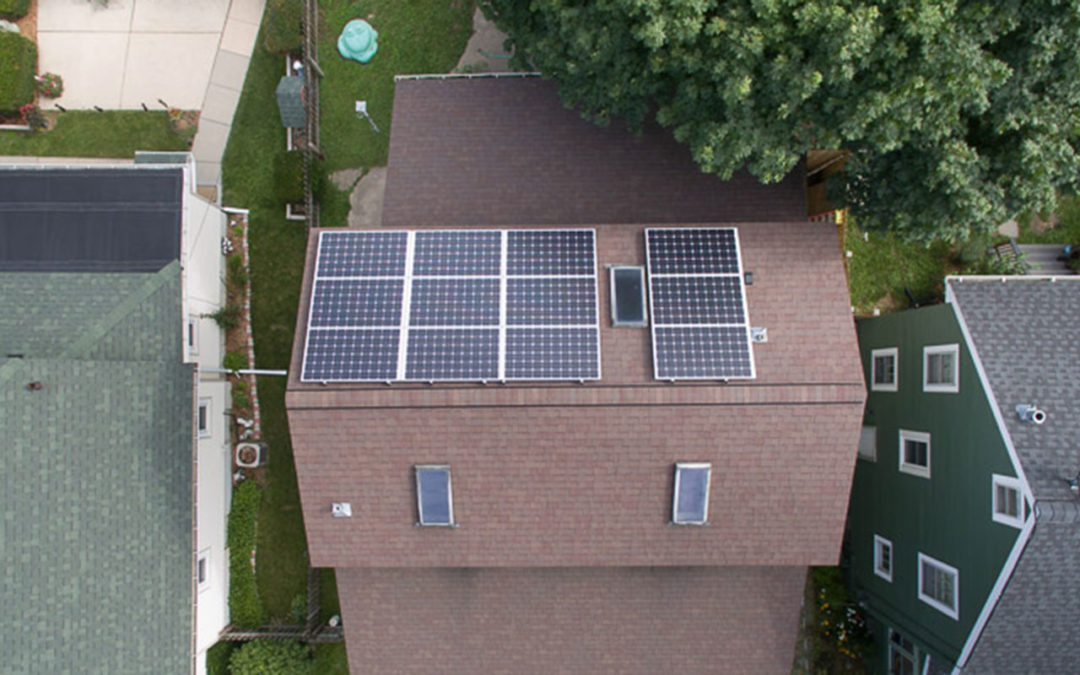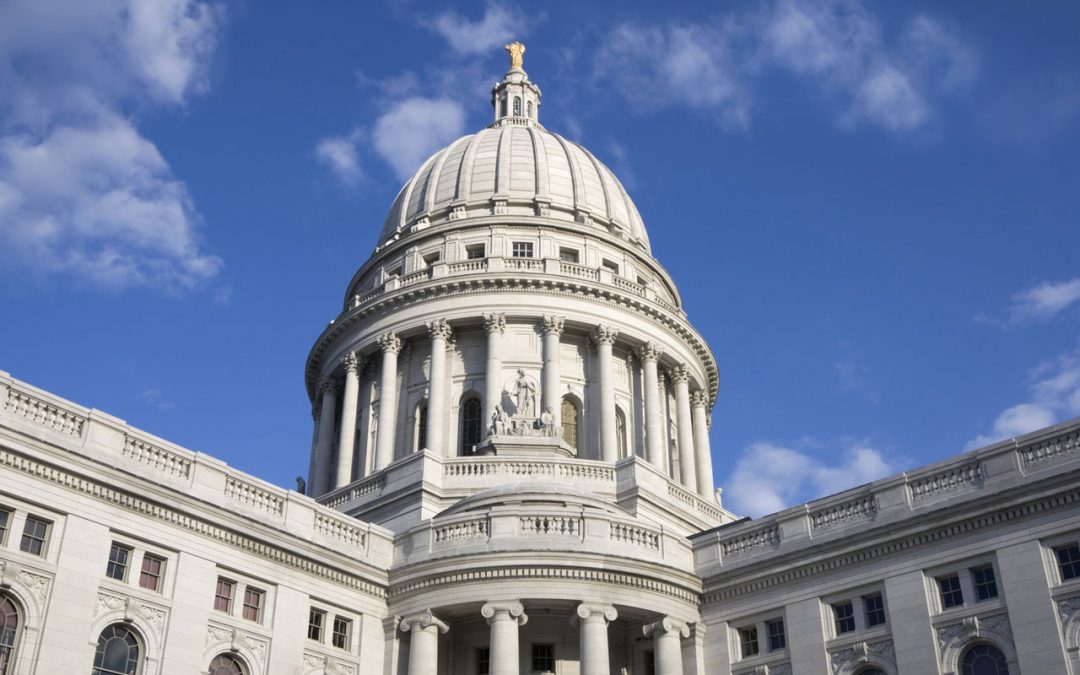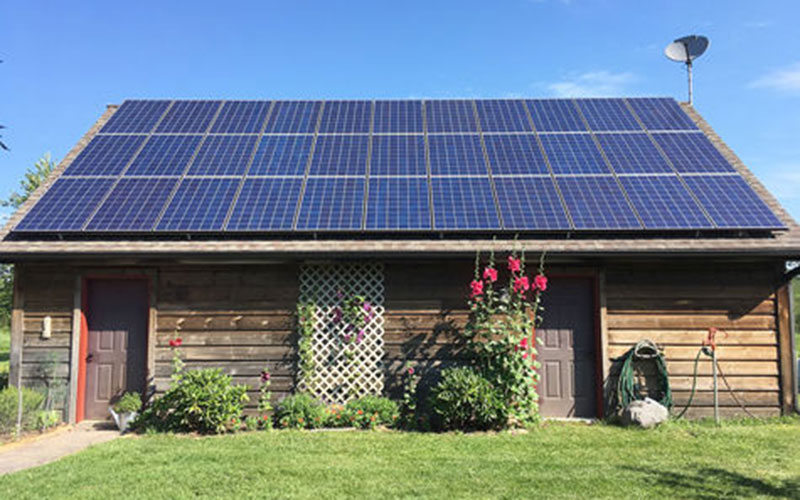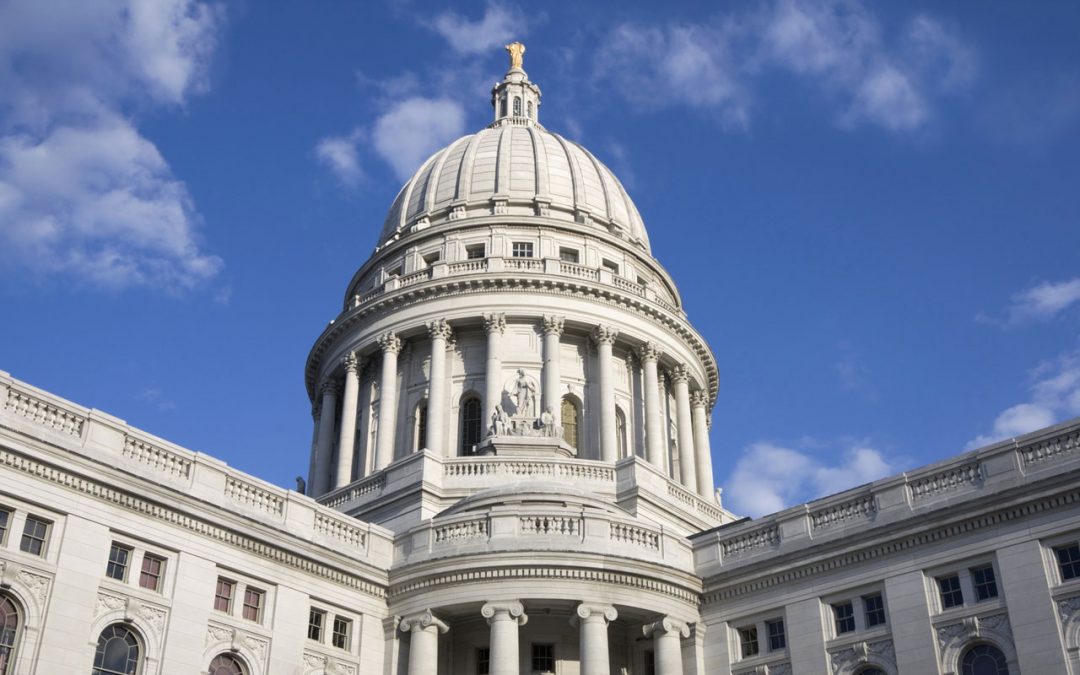
by Andrew Kell | Mar 18, 2022 | Advocacy, Policy, PSC Priorities, Public Service Commission, Solar
In June of 2020, the Public Service Commission of Wisconsin (PSC) opened an investigation into parallel generation (docket 5-EI-157). Parallel generation refers to distributed generation (DG) that is sited at a customer’s premises and can 1) produce energy for the customer’s energy use, and 2) produce and sell to the utility energy that exceeds the customer’s use. The most common type of DG is a solar photovoltaic (PV) rooftop system.
According to the PSC Notice of Investigation, this ongoing parallel generation investigation aims to gather information on costs, markets, emerging technologies, and barriers to DG in the state. A January 2021 RENEW blog described the initial activities in the docket.
After gathering information, the PSC made an initial decision in the docket to further explore:
- avoided costs and buyback rates for DG;
- net metering;
- contracts; and
- consistent terminology and terms of service across the state.
To better understand the value of DG, the PSC directed the five largest investor-owned utilities in Wisconsin to provide modeling and calculations of ‘avoided costs’ and revise the rates at which the utilities purchase energy from DG (also called ‘buyback rates’).
The utility’s buyback rate is a critical economic variable for DG. When homeowners and businesses entertain the idea of solar generation on their rooftops, they must first consider the costs and benefits of installation. The principal economic benefits of installing solar are reducing the energy you buy from the utility and getting paid for the excess energy you sell to the utility. Outside of the net energy billing services available for small installations, most utilities in Wisconsin pay very little for the energy they purchase from DG customers. Utility payments to DG customers don’t recognize the value of local, clean energy, which then oppresses the development of DG and hinders the advancement of carbon reduction goals.
It became apparent that upcoming PSC decisions would reset buyback rates and influence the business case for DG in Wisconsin, potentially for decades to come. As a result, RENEW put together a plan to participate in the utility cases and contracted with GridLab and Synapse Energy Economics to provide expert testimony on the issues.
When the utilities filed their buyback rate applications in early September last year, there were no major surprises to the clean energy community. Rather than model and calculate the long-term avoided costs of local, renewable DG, as the Commission requested, utilities either cited short-term marginal prices for some costs or simply stated that DG provides no value for other costs. RENEW needed to do more than simply critique the utility applications. The RENEW team developed a complete counterproposal for the Commission’s consideration, premised on criteria established by the Commission and just, reasonable buyback rates for DG customers.
Over several months, RENEW collaborated with its consultants and Keyes & Fox, a firm dedicated to clean energy law. Focusing on the Commission’s conceptual framework of avoided energy, generating capacity, and transmission costs, RENEW’s team gathered information, developed and ran market models, and calculated buyback rates. This ensured that RENEW’s proposal would meet the Commission’s requirements and recognize the actual value renewable DG provides to all utility customers.
These efforts resulted in a comprehensive framework for the Commission to consider and adopt for all utilities across Wisconsin. The RENEW team is now submitting testimony and evidence to support this comprehensive framework in all five utility cases.
RENEW now needs your support! The Commission will soon open the public comment period for these five cases and needs to hear from clean energy organizations, climate activists, businesses, and residents across Wisconsin. Below is a list of the five utility cases. RENEW will update the list with dates and direct links to make public comments when the public comment period becomes known. Since Commission decisions in these cases will set a precedent for all utilities in Wisconsin, we encourage you to comment on all 5 cases.
Click on applicable links below to submit comments for each utility.
Energy Policy Nerd Alert!
If you are interested in reading through the details of RENEW’s testimony filings, below are links to direct testimony filings for the case proceeding first (Xcel Energy, aka Northern States Power Company-Wisconsin). Testimony for other cases mentioned above will be available at a later date.
Direct Testimony of Andrew Kell
Direct Testimony of Michael Vickerman
Direct Testimony of Divita Bhandari (Synapse consultant)
Direct Testimony of Rachel Wilson (Synapse consultant)

by Jim Boullion | Mar 18, 2022 | Advocacy, Community Solar, Electric Vehicles, Energy Storage, Legislative Watchlist, Local Government, Policy, Solar
The 2021-22 legislative session in Wisconsin is now over. It was a busy session for clean energy initiatives with legislation introduced to allow more community solar, clarify the rules for leasing solar equipment, and update the regulations for electric vehicle (EV) chargers. Most of these bills were bipartisan, with support on both sides of the aisle. See the bottom of this article for a summary of this year’s major clean energy legislation.
The session started when Governor Tony Evers introduced his 2021-23 Budget Bill in February 2021. It included 28 provisions (many of them drawn from the Governor’s Taskforce on Climate Change) that would have advanced Wisconsin’s clean energy and energy efficiency. Among those provisions were recommendations to expand Focus on Energy, invest in the clean energy workforce, and support Wisconsin’s electric vehicle infrastructure. Unfortunately, by the time the Governor signed the Budget in July, those provisions were removed from the Budget and did not pass.
On November 15, several Democratic legislators introduced a package of 22 bills called Forward on Climate. The package proposed increased funding for Focus on Energy, on-bill financing of energy efficiency improvements from utilities, and a Wisconsin Climate Corp to provide training and opportunities in clean energy industries for Wisconsin’s youth. The session ended without any of these bills being adopted. Still, it outlined what kinds of initiatives they support to create good, family-supporting jobs, reduce inequality, and fight climate change through Wisconsin-centered policies.
What passed and what progress was made?
The only major clean energy bill that passed this session was a bill to modernize the PACE financing program. However, many clean energy initiatives made in-roads with legislators from both sides of the aisle. The new technology developments and dropping prices for renewable energy over the last few years is an excellent story for reducing emissions, bolstering economic growth, diminishing energy prices, and creating jobs. Even if there are still hurdles to overcome, everyone is interested in learning more.
There is growing interest among a wide range of stakeholders in clean energy legislation. The best example is SB 490, the community solar bill, where many diverse interests have registered in support. While some groups have expressed concerns with the bill, most business and public interest groups who registered support this kind of change.
Even though we didn’t pass them this session, electric vehicle legislation is also getting attention, especially in light of the volatile gas prices this year. As the price of EV battery production falls, the initial price of EVs will get more competitive, making the cost of EV operations compared to petroleum-powered vehicles very attractive.
The EV transition is coming fast, and we need to be ready. We need to finalize the rules and regulations over EV charging, determine how to pay for the roads if the gas tax generates less income, and streamline the buying process for new EVs coming into the market. One of the big things happening in the coming year is the millions in federal Infrastructure Investment and Jobs Act money coming to Wisconsin for EV infrastructure. We need to work with all stakeholders to ensure that Wisconsin can utilize that money efficiently.
What happens next?
Over the summer and fall, RENEW Wisconsin will meet with candidates running for state and federal office. We will be educating them about new developments in clean energy and electric vehicles and discussing essential policy changes we need to make these advances available to everyone in Wisconsin.
You can also do your part by getting involved in your local elections, talking to your local candidates, and supporting the candidates who support clean energy with your votes, time, and financial contributions. This time of year, candidates are especially interested in what you have to say and will take the time to listen. Clean energy can have a big year in 2023, but only if we do the work this year to educate and help elect candidates who will support us!
If you would like information on any clean energy issues or the elections, please contact Jim Boullion, Director of Government Affairs, jim@renewwisconsin.org,
2021-22 Wisconsin Legislative Session
Clean Energy and Electric Vehicle Issue Summary
PACE Financing Modernization – (SB 692/Wisconsin Act 175 – Sen. Cowles and Rep. Thiesfeldt)
- Expands type of projects that may be financed: Adds energy reliability improvements, weather-related resiliency projects, electric vehicle charging infrastructure, and stormwater control measures.
- Financing: Defines the term of the repayment period, clarifies that financing may be repaid through a lien, and ensures that mortgage holders provide written consent before the issuance of funding.
- Performance Requirements: Removes the requirement for project savings to exceed project costs and would instead require a third-party assessment of the anticipated energy and water cost savings from the proposed project and confirmation of proper installation after work is completed.
- Excludes Residential PACE: Prohibits PACE financing for residential units of less than five units. PACE loans will remain only for commercial or industrial buildings.
Assembly: Passed on voice vote (2/23/2022) and sent to Governor for signature.
Senate: Passed 32-0 on 2/15/22.
RENEW Position: Support.
EV Charging Rules – (SB 573 – Sen. Cowles and Rep. VanderMeer) Clarify that selling electricity by the kilowatt-hour to electric vehicles (EVs) does not subject EV charging station owners to utility regulation. No city, village, town, county, school district, special purpose district, or state agency may own, operate, manage, lease or control a charging facility. Local governments can authorize a utility or private entity to operate a charger on their property. Requires that all energy come from the local utility, limiting Solar+Storage EV charger availability.
Senate: Passed on vote of 19-13 (2/15/2022). Did not concur with Assembly Amended bill 3/8/22
Assembly: Passed on voice vote, with amendment, (2/24/22). Failed to pass.
RENEW Position: Oppose due to restrictions on non-utility energy sources and restrictions on the State and local governments from owning or operating EV chargers.
Expanded Development of Community Solar – (SB 490 / AB 527 – Sen. Stroebel and Rep. Ramthun) Would authorize the development of non-utility-owned community solar projects, allowing more individuals and businesses to access clean energy, save money and create good-paying jobs. Require local investor-owned utilities (Cooperative and municipal utility territories would be exempt) to provide credits on utility bills of subscribers for the energy generated by the system. Directs the PSC to develop rules that will establish fair credit rates and compensation to utilities for the use of utility infrastructure and billing.
Assembly: Energy and Utilities. Failed to pass.
Senate: Utilities, Technology, and Telecommunications. Failed to pass.
RENEW Position: Support
3rd Party Financing/Leasing – (SB 702 / AB 731– Sen. Cowles and Rep. Cabral-Guevara) Clarify that 3rd party financing/leasing of renewable energy equipment is legal in Wisconsin.
Assembly: Energy and Utilities. Failed to pass.
Senate: Utilities, Technology, and Telecommunications. Failed to pass.
RENEW Position: Support
Energy Storage Sales Tax Exemption – (SB 672 /AB 710 – Sen. Cowles and Rep. Duchow) Clarify that battery storage devices installed as part of a renewable energy system should be included in the sales tax exemption for renewable energy system equipment.
Assembly: Committee on Ways and Means. Failed to pass.
Senate: Committee on Financial Institutions and Revenue. Failed to pass.
RENEW Position: Support
Use $10 million of VW Settlement Funds for EV Charging Station Grants – (SB 663/AB 695 – Sen. Cowles and Rep. VanderMeer) Grants from these funds will be used to install electric vehicle charging stations at key locations throughout Wisconsin. Requires the PSC and DOT to study how the growing number of EVs will impact the transportation fund and determine methods to ensure they contribute to that fund equitably. Grant recipients can only resell electricity obtained from the local electric utility. $5m for EV Corridors; $3m for businesses or multifamily; $2m to be determined by PSC.
Senate: Committee on Transportation and Local Government. Passed committee 5-0. Failed to pass.
Assembly: Committee on Energy and Utilities. Failed to pass.
RENEW Position: Support
Direct Purchase of Electric Vehicles – (SB 462 / AB 439 – Sen. Kooyenga and Rep. Neylon) Would enable electric vehicle manufacturers to deliver and service vehicles in Wisconsin using online sales or manufacturer-owned dealerships without going through a 3rd party dealership.
Senate: Senate Gov. Operations Committee. Passed Committee 4-1. Failed to pass.
Assembly: Committee on Transportation. Failed to pass.
RENEW Position: Support
Create a System to Measure Carbon Emissions for Animal Agriculture Operators. (SB1054 / AB 1072 – Sen. Cowles and Rep. Tauchen).
- DATCP shall establish voluntary and market-driven standards for quantifying the carbon emissions produced directly and indirectly from an animal agriculture operator’s activity.
- DATCP must facilitate trade in products and services related to transactions between animal agriculture operators and other parties for carbon emission offsets and may operate an electronic marketplace for selling and purchasing carbon emission offsets.
- PSC shall develop a statewide master plan for collecting, transporting, and commercializing renewable natural gas produced from animal wastes, biomass, and other organic sources.
- PSC will establish standardized power purchase agreements and standardized agreements for the provision of energy as a service between animal agriculture operators and electric utilities
Assembly: Committee on Energy and Utilities. Failed to pass.
Senate: Committee on Natural Resources and Energy. Failed to pass.
RENEW Position: Support

by Jim Boullion | Mar 10, 2022 | Action Alert, Advocacy, Electric Vehicles, Energy Storage, Legislative Watchlist, Local Government
Yesterday, in a unanimous vote of 31-0 (2 not voting), the State Senate voted against concurrence in the Assembly amended version of the EV charging bill, SB 573. The bill aimed to define who can provide EV charging services, how customers will pay for it, and the electricity source for the chargers.
Wisconsin law does not have specific guidance on EV charging, so non-utility-owned EV charging stations set their fees on a per-minute basis, not on the amount of energy delivered. This policy results in owners of slower charging vehicles paying more for power than owners of fast charging vehicles. SB 573 would have allowed businesses to set fees based on the amount of electricity used, but several provisions to the bill concerned clean energy advocates.
“While this bill addressed some of the issues with current policy, it would have also disincentivized solar-powered EV chargers and severely limited local government investment in EV charging,” said Heather Allen, Executive Director at RENEW Wisconsin. “RENEW Wisconsin opposed SB 573 in its current form and applauds yesterday’s Senate decision.”
SB 573 would have prohibited charging a fee if any non-utility-generated electricity was provided through a non-utility-owned EV station. The provision would limit the use of rooftop solar and stand-alone solar+storage EV charging equipment in Wisconsin, which provides numerous benefits such as controlling energy costs, facilitating EV charging in rural areas, increasing resilience and safety, and providing carbon-free electricity.
The restrictions on local government ownership or operation of publicly available EV chargers would have reduced access to EV chargers in many underserved areas because revenue from electricity sales alone may not generate enough income to justify private business investment in small towns, urban streets, or other locations. Local government participation allows EV infrastructure to expand in areas where private businesses are not investing.
“While this particular legislation did not pass, the issues the bill was attempting to resolve remains unsettled,” said Jim Boullion, Director of Government Affairs at RENEW Wisconsin. “RENEW Wisconsin will continue to work towards better policies that help everyone in Wisconsin benefit from the fast-developing electric vehicle revolution.”




